|
Cesar Chavez & the UFW |
Labor and Civil Rights |

1903 |
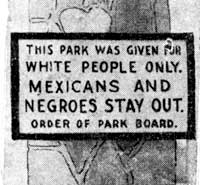
|
Japanese Mexican Labor Assoc. sugar beet strike, Oxnard, California. The American Federation of Labor (AFL) refuses to let the organization join if it accepts Japanese or Chinese members
|
| 1909 |
National Association for the Advancement of Colored People (NAACP) founded in response to the 1908 race riot in Springfield, Illinois, birthplace of President Abraham Lincoln
|
| 1913 |
International Workers of the World Wheatland strike near Marysville, California. The strike leaves four men dead
California passes law restricting “alien land purchases” to keep Asians from buying property
|
| 1924 |
Immigration Act bars entry to all Asians, leading to importation of workers from the Phillipines, an American possession
|
| 1927 |
Cesar Chavez born, Yuma Arizona, to Juana and Librado Chavez. He will be one of seven children
|
|
| 1935 |
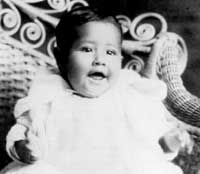
Baby Cesar at baptism. |
The Congress of Industrial Organizations (CIO) is formed
|
| 1936 |
National Labor Relations Act takes effect, excluding farmworkers from protections enjoyed by other workers
|
| 1937 |
The Chavez family loses their store and farm, and becomes migrant farmworkers in California
CIO organizes shed workers in Salinas
|
Auto workers sit-down strikes lead to a contract at General Motors in Detroit
|
| 1942 |
Bracero program begins, authorizing the importation of Mexican workers under contract to do agricultural and railroad work
|
Faced with the threat of a Negro march on Washington, President Rosevelt establishes the Fair Employment Practices Commission (FEPC), and opens war industries to blacks
Congress of Racial Equality (CORE) is founded in Chicago by conscientious objectors James Farmer and George Houser.
|
| 1946 |
Cesar Chavez joins the Navy, serves 2 years in the Pacific
|
|
| 1947 |
|
The Fellowship of Reconciliation (FOR) and CORE organize the Journey of Reconciliation, the first freedom ride on buses in the south
Taft-Hartley act limiting labor organizing is passed by Congress over President Truman’s veto
|
| 1948 |
Cesar Chavez marries Helen Favela. They move to San Jose
|
|
| 1949 |
|
Paul Robeson’s concert in Peekskill, NY attacked by vigilantes
CIO expells nine progressive labor unions that refuse to expel Communists from their leadership
|
| 1952 |
Fred Ross recruits Cesar Chavez into Community Services Organization. Chavez becomes a community organizer, and rises to head the organization
|
|
| 1954 |
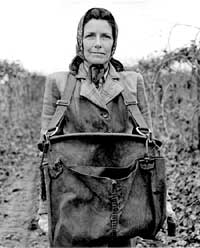
Mrs. Wilson, Peach Picker, 1950's
Photo: Ernie Lowe |
The US Supreme Court outlaws "separate but equal" schools in landmark case Brown vs. Board of Education
|
| 1955 |
Rosa Parks refuses to sit in the back of the bus in Montgomery, Alabama. Black citizens begin the Montgomery bus boycott, and Martin Luther King emerges as a leader
The AFL and CIO merge to become the AFL-CIO |
| 1960 |
Black college students begin lunch counter sit-ins in Greensboro, North Carolina, leading to the formation of the Student Nonviolent Coordinating Committee (SNCC)
|
| 1961 |
1961 SNCC and CORE begin Freedom rides by bus through the south
|
| 1962 |
Cesar Chavez leaves CSO and returns to Delano, California to start the National Farm Worker Association (NFWA). He is joined by Dolores Huerta, Gilbert Padilla, Jim Drake and others
|
|
| 1963 |
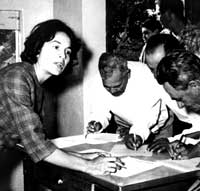
Dolores Huerta registering voters |
March on Washington, King’s “I Have a Dream” speech
|
| 1964 |
Three civil rights workers are killed in Mississippi during the Freedom Summer voter registration campaign of SNCC
|
| 1965 |
The Delano grape strike begins. The mostly Mexican NFWA joins mostly Filipino Agricultural Workers Organizaing Committee (AWOC)
|
Malcolm X is assassinated at the Audobon Ballroom in New York by men associated with the Nation of Islam
Civil rights march from Selma to Montgomery Alabama
Voting Rights Act passed
|
| 1966 |
Farmworkers walk 300 miles from Delano to Sacramento in a pilgrimage that ends on Easter Sunday. NFWA signs its first contract with Schenley. NFWA and AWOC merge to become the United Farmworkers Organizing Committee (UFWOC)
|
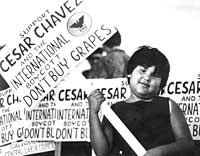 |
| 1967 |
Striking farmworkers and supporters begin a national boycott of California table grapes
|
| 1968 |
Cesar Chavez fasts in Delano for 25 days. He is joined by Sen. Robert Kennedy at the end of the fast. The UFW campaigns for Robert Kennedy in the California primary
|
Martin Luther King is assassinated in Memphis Tennessee, while leading a garbage workers strike
Robert Kennedy is assassinated in Los Angeles California on the night of the California Presidential primary
|
| 1970 |
UFWOC signs three-year contracts with the Delano growers, ending the grape strike and boycott
Salinas lettuce and vegetable growers sign with Teamsters Union. UFW protests deal and declares strike and boycott.
|
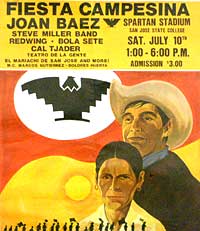 |
| 1972 |
The UFW admitted as full member to the AFL-CI.
Chavez fasts in Arizona against restrictive farm labor law. The slogan of his fast is Si Se Puede!
|
| 1973 |
When grape contracts expire, growers sign with the Teamsters Union. Major UFW strikes spread throughout California, with thousands arrested and two dead
|
| 1975 |
California passes the Agricultural Labor Relations Act (ALRA), the first law recognizing the rights of farmworkers to organize and bargain collectively. The UFW wins a majority of elections
|
| 1978 |
The Teamsters Union withdraws from the fields
|
| 1981 |
|
President Reagan fires air traffic controllers
|
| 1982 |
George Dukmeijian is elected governor of California with strong support from agriculture. Enforcement of the ALRA slows
|
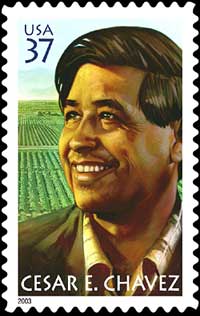 |
| 1988 |
Cesar Chavez conducts a Fast for Life, his last and longest fast, in Delano California
|
| 1993 |
Cesar Chavez dies in Yuma, Arizona. His funeral in Delano CA is attended by 40,000 people.
Arturo Rodriguez is named new UFW president
|
| 1994 |
Cesar Chavez is awarded a posthumous Medal of Honor by President Clinton
|
1994
to
2004 |
UFW wins new contracts representing workers in rose, mushroom, strawberry, wine grape, lettuce and vegetable workers in California, Florida and Washington state
|
| 2000 |
California establishes a state holiday in honor of Cesar Chavez
|
| 2003 |
Cesar E. Chavez commemorative stamp is issued by the United States Postal Service
THE FIGHT IN THE FIELDS CONTINUES... |

